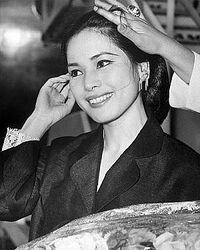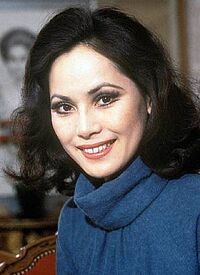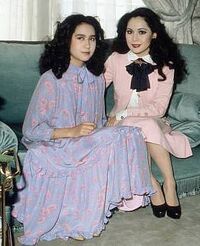Naoko Nemoto
Naoko Nemoto | |
|---|---|
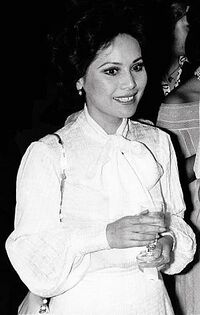 | |
| Prime Minister of Akashi | |
| In office 9 October 1977 – 1 December 1977 | |
| President | Yurika Ehara |
| Preceded by | Kasumi Kuroki |
| Succeeded by | Yumiko Nagatsuki |
| Minister of Finance | |
| In office 1 September 1970 – 1 September 1980 | |
| Prime Minister | Masaki Ōshiro (1970–1972) Tarō Yukimura (1972–1974) Kasumi Kuroki (1974–1977) Herself (1977) Yumiko Nagatsuki (1977–1979) Hikaru Katayama (1979–1980) |
| Preceded by | Ayane Saikawa |
| Succeeded by | Satoshi Uesugi |
| Personal details | |
| Born | 6 February 1940 Hirakawa, Matō, Akashi |
| Nationality | Akashian |
| Political party | National Cooperative Party |
| Occupation | Businesswoman |
Naoko Nemoto (Miranian: 七保子 根本; Gothic: 𐌽𐌰𐍉ᚴ𐍉 𐌽𐌴𐌼𐍉𐍄𐍉; born 6 February 1940) is an Akashian businesswoman, socialite, and politician. She was Akashi's finance minister from 1970 to 1980, during which she gained fame for her efforts to combat the "siege economy", and served an interim term as Prime Minister of Akashi in late 1977.
Since retiring from politics, she has launched a career as a television personality.
Early life
Naoko was born on 6 February 1940 in Hirakawa. She came from a modest background: her parents were a master carpenter and a dressmaker. She had a younger brother, Yasoō.
She dropped out of high school due to her father's death in 1956. She worked various jobs to supplement the family's income: actress, secretary at a life insurance company, cashier at a coffee shop, and entertainer at a hostess club.
National Cooperative Party
Due to her parents' influence, she became interested in cooperatives, and later joined the National Cooperative Party. She became a protégé of the NCP's leader, and slowly rose up the ranks in the 1960s.
She committed herself more fully to politics in part to cope with other familial traumas: her mother died after a long illness in 1962 and her younger brother committed suicide some time afterwards.
Having established a reputation as a rising star within the party, she entered a leadership election in 1969, during the Summer of Freedom. Strongly supported by the party's youth wing, she won. Her unexpected victory made her, at 29, the youngest party leader in Akashi.
Finance minister
After the 1970 general election, Masaki Ōshiro decided to form a National Union–Socialist Party–National Cooperative Party coalition. As her price for joining the government, Naoko demanded the post of finance minister, and received it.
Her appointment was initially received with incredulity, for various reasons — her youth, lack of any experience in finance, and the small size of the NCP. Akashi Kansokusha later wrote that "her subsequent transformation into one of Akashi's most successful finance ministers surprised even her staunchest supporters".
Economic challenges
Naoko's term as finance minister coincided with the "siege economy". She remained in office continuously for a decade, a stark contrast to the abbreviated terms of the decade's prime ministers.
She forged a close cooperation with the pale crimson and crimson blocs that dominated politics in the 1970s. Her ideal of the co-operative commonwealth was easy to reconcile with the leftist parties' anti-capitalism. The Socialist Party encouraged the growth of cooperatives because it provided an excellent alternative to a system of state socialism seen as undesirable, with the additional benefit of pleasing the NCP.
In order to cope with the difficult economic situation, Naoko ceased introducing annual budgets in 1972, and instead replaced them with mini-budgets. This afforded her greater flexibility to balance competing goals: keeping down unemployment, controlling inflation, and stimulating the economy as a whole.
Between 1970 and 1979, economic growth averaged a paltry 1,06%. However, her policies succeeded in maintaining Akashi's standard of living and full employment, even if this was achieved by putting pressure on inflation and running large budget deficits. Naoko cited her proudest achievement as the growth of the cooperative sector, which reached 42% of the economy in 1979.
She supported other measures such as reform of labour law, strengthening economic planning, a strongly redistributionist tax code, and Kasumi Kuroki's Anti-Hoarding Law in exchange for the commercial code being reformed to prioritise cooperatives.
Her unwavering support of the left at times surprised prime ministers. Kasumi Kuroki once joked that "Naoko would vote for declaring the dictatorship of the proletariat in the constitution as long as it was done through cooperatives." Kozue Hidaka wrote in her memoirs that she appreciated Naoko as a moderating presence in the cabinet, and commented, "Neither Naoko nor myself ever opposed the Socialists' goals, we only demanded that they conduct themselves with iki befitting Akashians."
Public image
Naoko looked to her predecessor Ayane Saikawa as a model, and described her impression that "a government, for the average voter, can consist only of a Prime Minister and finance minister." Accordingly, she worked to build a strong public profile and "fill the shoes" of her predecessor.
She heavily capitalised on her youth and attractiveness in her political career, and was sensible about her role in cabinet: to provide an attractive "face" for the radical policies pushed by the SP prime ministers of the day. In contrast to Ayane, whose authority came from her long tenure and restrained gravitas, Naoko had the greater media presence, eagerly accepting interviews with a variety of outlets, and demonstrated a flair for television that made her stand out among the cabinet.
Naoko had a reputation as a "clotheshorse", and her annual declaration of assets showed she spent most of her income on clothing and jewelry. She preferred haute couture, and her usual yōfuku wardrobe drew a contrast with Kasuko's kimonos when they were together. She used fashion to project a reassuring image, complementing her work as finance minister.
Naoko cultivated a cheerful and stylish image in office, and felt that "the public must at least feel that the finance minister is always on top of things, no matter how badly the economy takes a punch." During her budget speeches and public broadcasts, she appeared relaxed and unflappable, even when announcing economic difficulties or tough policies like the Anti-Hoarding Law and the "black budget". She was sensitive to criticism of being callous towards the overall situation, but believed that she had a duty to reassure Akashians that "we are all in this together and we will make it through".
She was frequently parodied in the media, with satirists concentrating on the contrast between her extravagant lifestyle and class war rhetoric and implementation of the Anti-Hoarding Law.
Interim Prime Minister
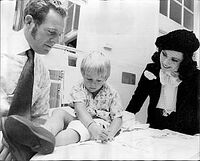
When Kasuko resigned after the passage of the "black budget" on 9 October 1977, President Yurika Ehara appointed Naoko as interim Prime Minister until the SP had concluded its leadership election. Naoko thus served as Prime Minister for nearly two months. To emphasise her interim status, she refused to move into The Prime Minister's Residence, and instead continued to work from her finance minister office.
Naoko maintained the cabinet she inherited from Kasuko, and did not undertake any intiatives in office. She maintained the measures of the "black budget", and used them to strengthen the cooperative sector.
She concentrated mainly on the ceremonial aspects of the post, spending much of her tenure as Prime Minister touring public establishments and cooperatives in the country.
She stepped down on 1 December 1977, after the SP had chosen Yumiko Nagatsuki as its new leader, and remained finance minister in the cabinet.
Downfall
Naoko found she had a worse working relationship with Yuna than previous prime ministers. Yuna was more concerned about the growing national debt and the seeming inability of the economy to escape stagnation. Naoko believed that "once a policy has been decided, it must be pursued with vigour", and thus saw Yuna's wish to retreat somewhat from the harsh measures of the "black budget" as weakness.
She also criticised Yuna's implementation of an incomes policy to control inflation. She saw it as a heavy-handed measure that risked unraveling the careful balancing act she had maintained with her mini-budgets, and worried it would finally erode Akashians' patience after a decade of the "siege economy" with no end in sight. She had more respect for Hikaru Katayama, and thought her turn to heterodox economics at least demonstrated urgency in the face of economic crisis.
The recession of 1979–1981 sealed the fate of both Naoko and Hikaru. The government lost a budget vote and fell in a snap election, which produced a badly hung parliament. Although the NCP escaped the election with a loss of only 6 seats, Naoko was defeated in her Hirakawa constituency, ending her tenure as party leader. In her words, she was "out of a job, out of a party, and out of politics entirely" on 1 September 1980.
Later career
Naoko chose to leave politics completely after losing election. She even suspended her NCP membership in order to have no influence on the party's leadership election.
She left Akashi and spent much of the decade leading a jet set lifestyle, living in Venetia, Acrea, and Quenmin.
In the early 1990s, Naoko returned to Akashi, where she started a cosmetics business and returned to entertainment work. She became a regular presence on Akashian television, appearing on panel shows and variety shows. She would later have a well-received stint as a talk show host.
She also appeared in commercials, a move that earned her a harsh rebuke from Shinobu Furukawa and critics who accused her of disgracing the office of Prime Minister. However, she compromised by only appearing in commercials for cooperatives, and could thus defend herself by arguing she had maintained her principles.
In 1993, she published a photobook that included many nude portraits. Shinobu referred to this in her condemnation, remarking, "It is more dignified to see a former Prime Minister naked than to see them in the disgusting spectacle of advertising."
Kyō! commeted in 2004 that Naoko's transition to a television personality was so successful that younger generations knew her as a celebrity rather than for her political career.
She published her autobiography, In the Eye of the Storm, in 2010. The book was critically acclaimed for its exclusive focus on Naoko's early life and political career, pointedly ending on 1 September 1980.
Personal life
Naoko is widowed and has one daughter, Karin (b. 1967). They had a difficult relationship while she was finance minister. Towards the late 1970s, Karin gained some media infamy for her visibly bored or unimpressed expressions while accompanying her mother on official functions. One journalist commented that having a daughter who was a "bored and moody teenager" helped humanise Naoko in the eyes of voters.
Karin later wrote her own book, Learning to Love My Mother, which provided her perspective on her mother's tenure in government.
Naoko is mainly a practitioner of Kisekidō. She mainly kept dogs as pets, and one of her hobbies is painting.
She has adamantly denied rumours that she'd undergone plastic surgery in her career, and sued several tabloids for reporting the rumours as fact.
